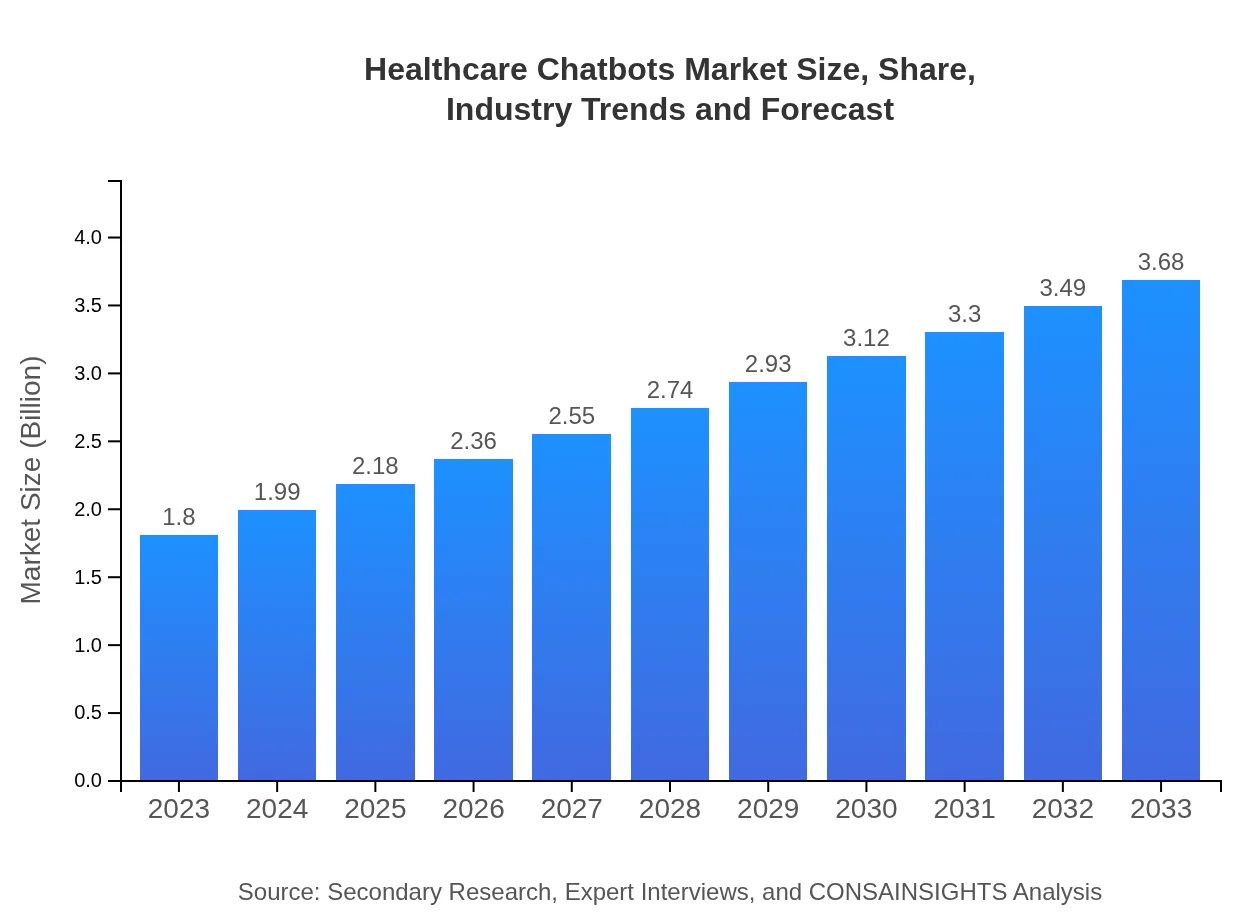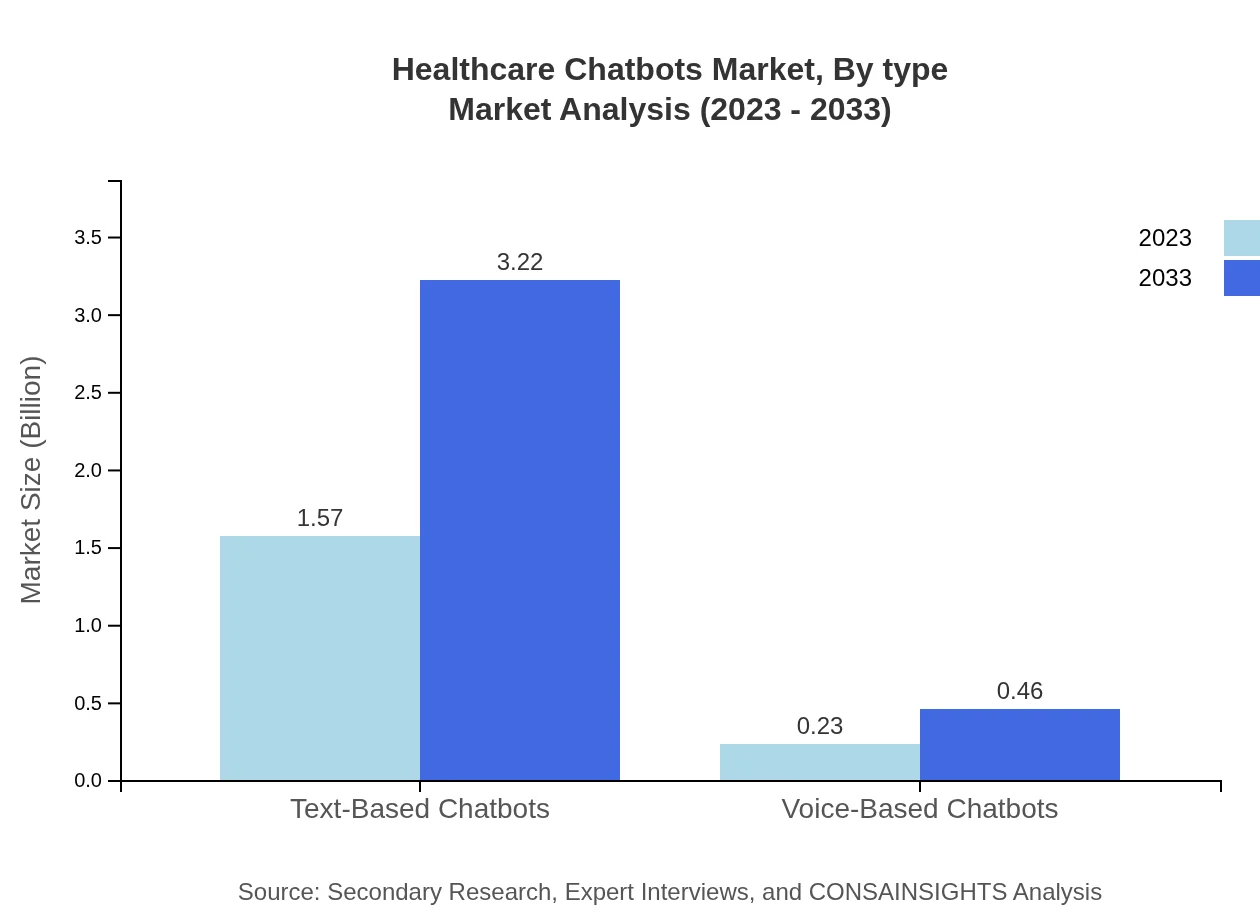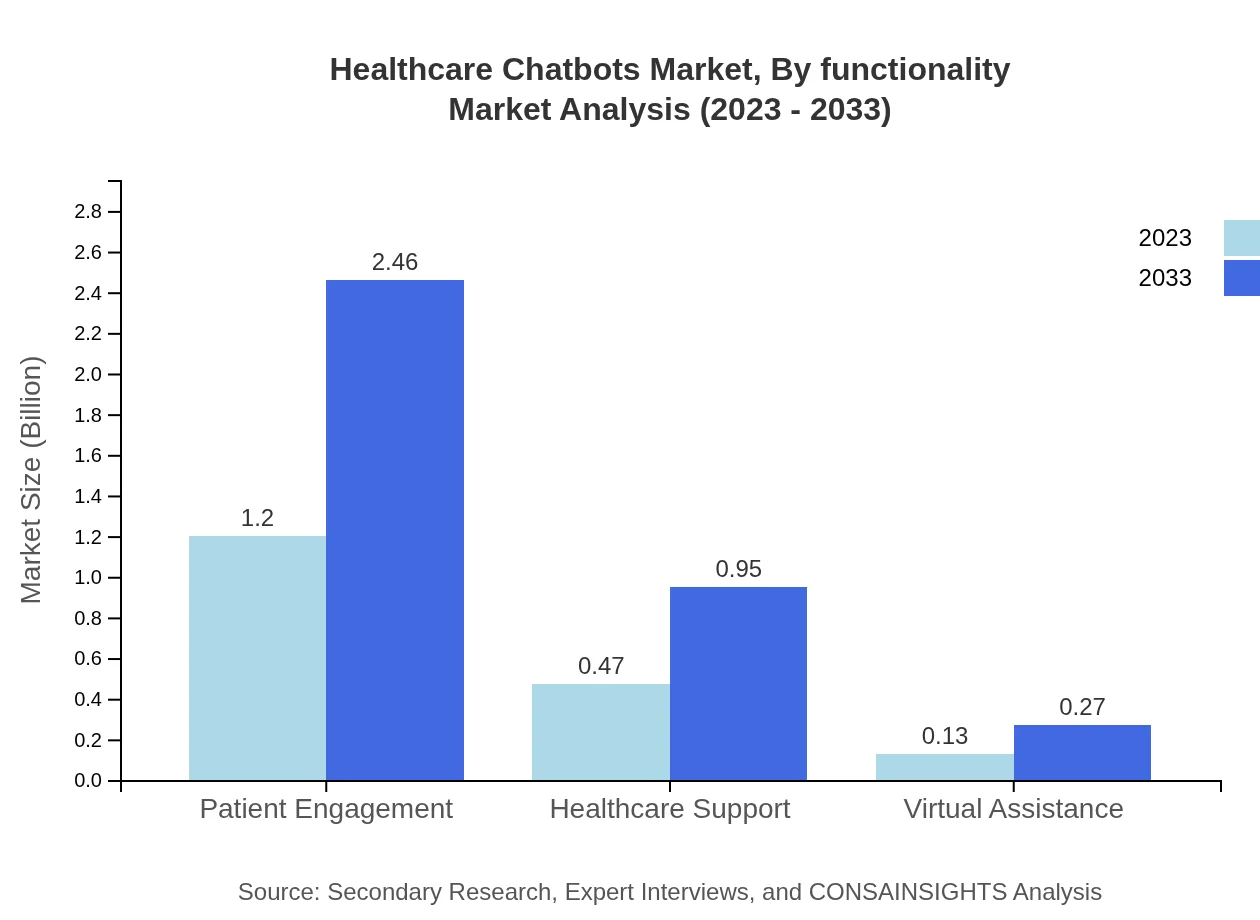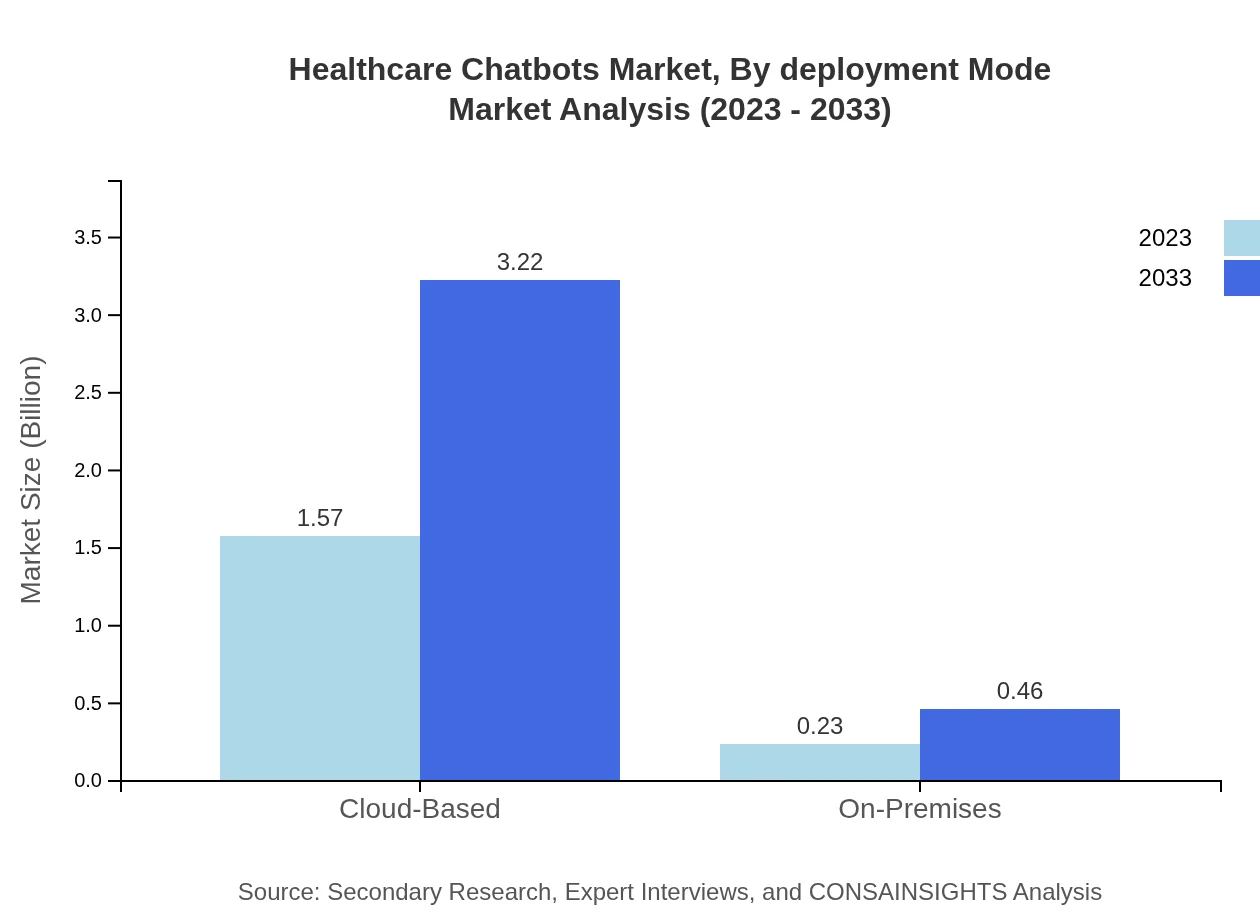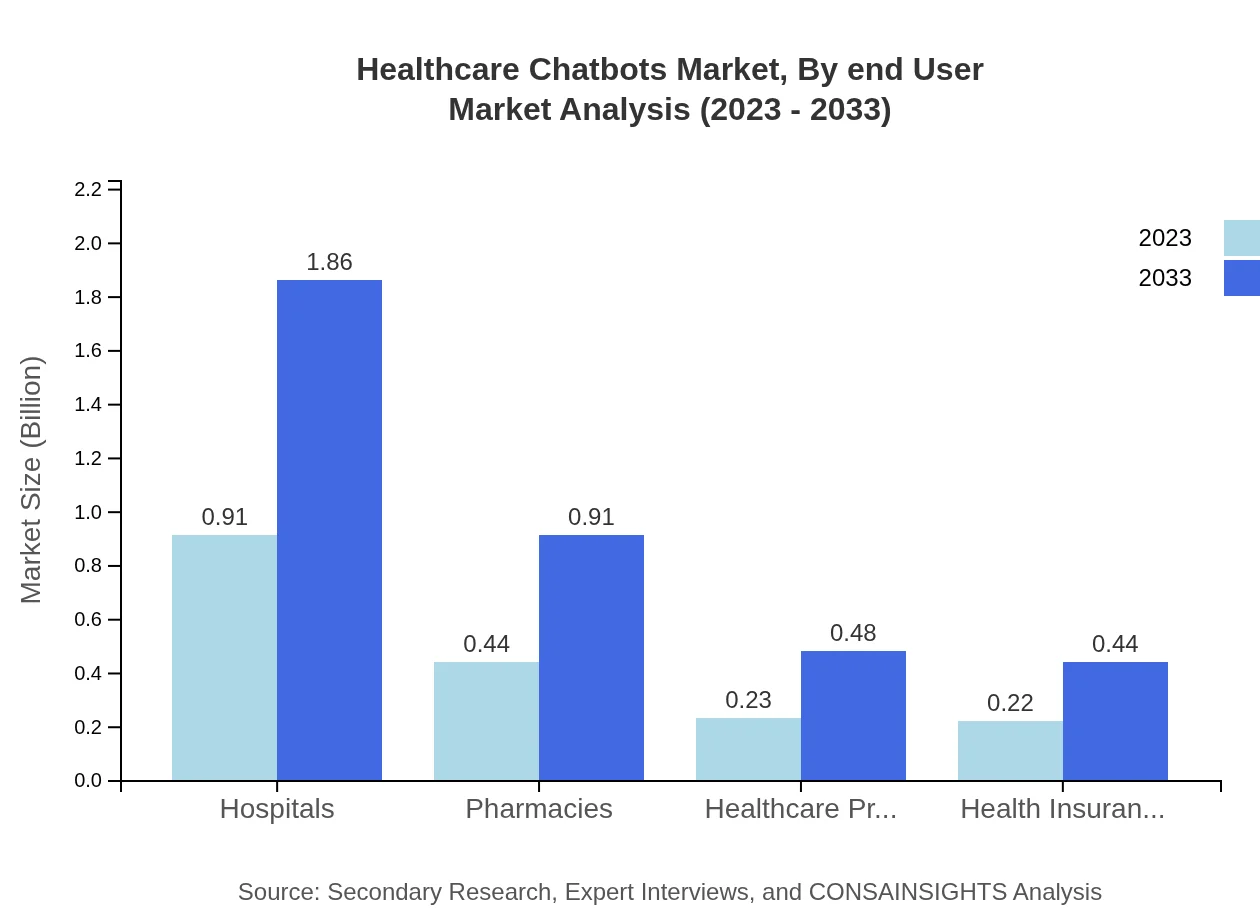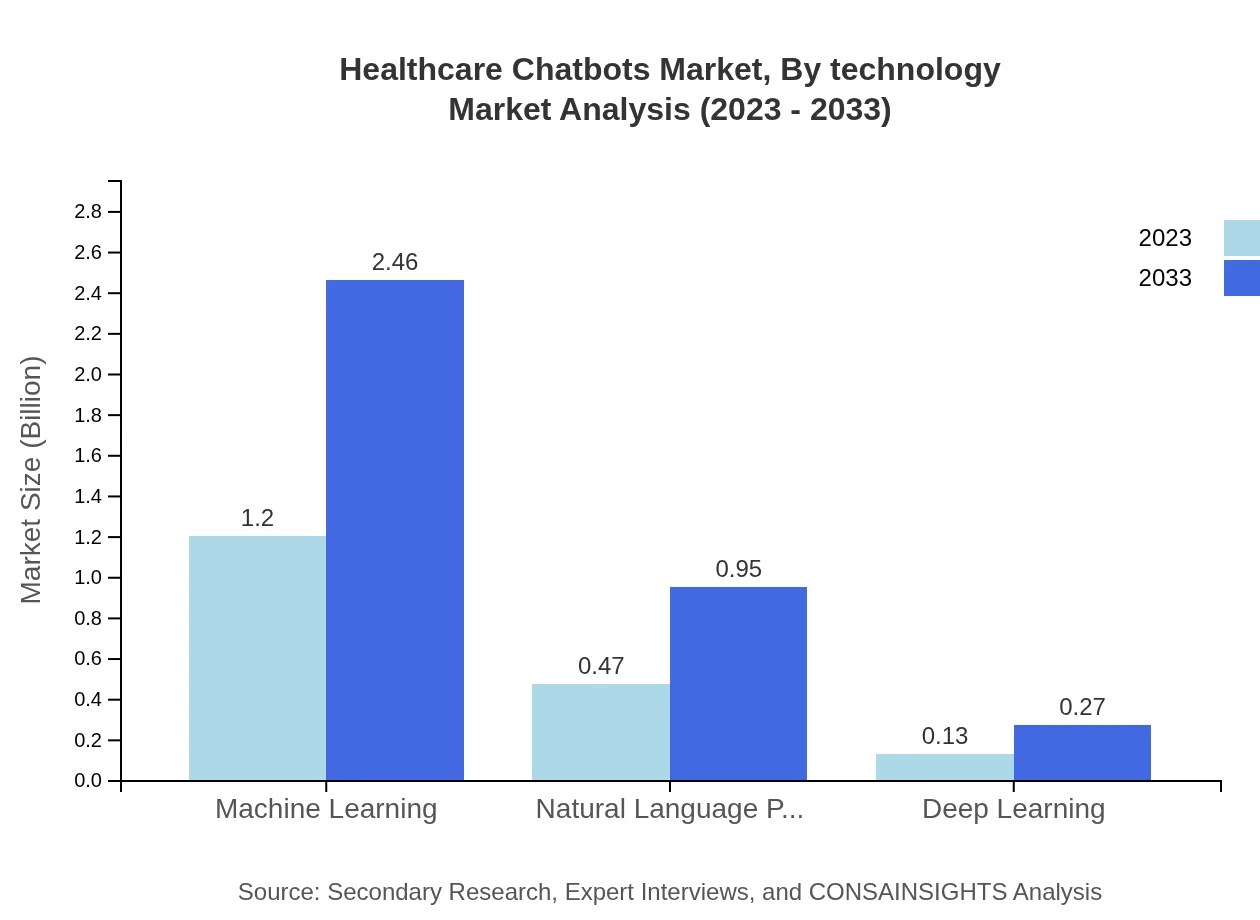Healthcare Chatbots Market Report
Published Date: 31 January 2026 | Report Code: healthcare-chatbots
Healthcare Chatbots Market Size, Share, Industry Trends and Forecast to 2033
This report provides a comprehensive analysis of the Healthcare Chatbots market from 2023 to 2033, detailing market size, trends, technology advancements, regional insights, and a segment analysis of key players driving this growth.
| Metric | Value |
|---|---|
| Study Period | 2023 - 2033 |
| 2023 Market Size | $1.80 Billion |
| CAGR (2023-2033) | 7.2% |
| 2033 Market Size | $3.68 Billion |
| Top Companies | IBM Watson Health, Buoy Health, Gyant, Mayo Clinic |
| Last Modified Date | 31 January 2026 |
Healthcare Chatbots Market Overview
Customize Healthcare Chatbots Market Report market research report
- ✔ Get in-depth analysis of Healthcare Chatbots market size, growth, and forecasts.
- ✔ Understand Healthcare Chatbots's regional dynamics and industry-specific trends.
- ✔ Identify potential applications, end-user demand, and growth segments in Healthcare Chatbots
What is the Market Size & CAGR of Healthcare Chatbots market in 2023?
Healthcare Chatbots Industry Analysis
Healthcare Chatbots Market Segmentation and Scope
Tell us your focus area and get a customized research report.
Healthcare Chatbots Market Analysis Report by Region
Europe Healthcare Chatbots Market Report:
Europe’s Healthcare Chatbots market is expected to more than double from 0.46 billion USD in 2023 to 0.94 billion USD by 2033, as regulatory frameworks support digital health innovations and stakeholders focus on cost-effective solutions to manage patient care.Asia Pacific Healthcare Chatbots Market Report:
In the Asia Pacific region, the Healthcare Chatbots market is growing rapidly, driven by increasing healthcare digitization and smartphone penetration. By 2033, the market is projected to reach 0.73 billion USD, up from 0.35 billion USD in 2023, as healthcare providers incorporate AI-driven solutions to enhance service accessibility.North America Healthcare Chatbots Market Report:
North America dominates the Healthcare Chatbots market, with a market size of 0.61 billion USD in 2023, expected to grow to 1.25 billion USD by 2033. This growth is propelled by high healthcare spending, advanced technology adoption, and a growing trend towards personalized medicine.South America Healthcare Chatbots Market Report:
The South American market, albeit smaller, is witnessing healthy growth. The transition towards digital healthcare solutions is gaining momentum, with projections suggesting growth from 0.14 billion USD in 2023 to 0.29 billion USD by 2033, driven by an increasing focus on improving healthcare access.Middle East & Africa Healthcare Chatbots Market Report:
The Middle East and Africa exhibit growing interest in Healthcare Chatbots, projected to see expansion from 0.24 billion USD in 2023 to 0.48 billion USD by 2033. Key factors include investment in digital infrastructure and a rising patient demand for accessible healthcare services.Tell us your focus area and get a customized research report.
Healthcare Chatbots Market Analysis By Type
The market is primarily dominated by text-based chatbots, projected to grow from 1.57 billion USD in 2023 to 3.22 billion USD by 2033. Voice-based chatbots occupy a smaller segment, expected to reach 0.46 billion USD by 2033. Text-based chatbots account for 87.43% of market share, while voice-based ones hold 12.57%, showing a strong preference for text interactions in the healthcare space.
Healthcare Chatbots Market Analysis By Functionality
Hospitals are the leading segment, with market size growing from 0.91 billion USD in 2023 to 1.86 billion USD by 2033, representing 50.43% of the market. Pharmacies follow, with a market size of 0.44 billion USD in 2023 rising to 0.91 billion USD by 2033. Healthcare providers and health insurance companies also contribute significantly, focusing on enhancing client engagement through chatbot integration.
Healthcare Chatbots Market Analysis By Deployment Mode
The deployment mode is segmented into cloud-based and on-premises solutions. The cloud-based segment is expected to grow from 1.57 billion USD in 2023 to 3.22 billion USD by 2033, representing 87.43% of market share, while on-premises solutions encompass 12.57%, growing modestly over the forecast period due to the shift toward cloud adoption.
Healthcare Chatbots Market Analysis By End User
Major end users include hospitals and health insurance companies, leading to robust market expansion from 2023 to 2033. Increased deployment of chatbots for patient management and streamlined operations reflect growing demand within these sectors. Hospitals are forecasted to maintain the largest share, while health insurance companies focus on personalized customer interactions.
Healthcare Chatbots Market Analysis By Technology
Machine learning is the predominant technology segment, projected to reach 2.46 billion USD by 2033 from 1.20 billion USD in 2023, holding 66.83% of the market. Natural Language Processing (NLP) occupies 25.84% with growth from 0.47 billion USD to 0.95 billion USD, while deep learning has a smaller impact but is integral to enhancing chatbot performance.
Healthcare Chatbots Market Trends and Future Forecast
Tell us your focus area and get a customized research report.
Global Market Leaders and Top Companies in Healthcare Chatbots Industry
IBM Watson Health:
IBM Watson Health leverages advanced AI technologies to provide insightful healthcare solutions, including chatbots designed for patient engagement and operational efficiency.Buoy Health:
Buoy Health specializes in digital health solutions, helping users navigate their health options through AI-driven chatbots that assess symptoms and provide reliable health information.Gyant:
Gyant offers a medical virtual assistant platform that utilizes AI to engage patients interactively, guiding them through their healthcare journeys effectively.Mayo Clinic:
Mayo Clinic has integrated sophisticated chatbot technologies to offer seamless patient communication and support services, improving overall patient experience.We're grateful to work with incredible clients.









FAQs
What is the market size of healthcare Chatbots?
The healthcare chatbots market is valued at approximately $1.8 billion in 2023, with a projected CAGR of 7.2% over the next decade. By 2033, the market size is expected to grow significantly, reflecting a robust demand in various healthcare applications.
What are the key market players or companies in the healthcare Chatbots industry?
Key players in the healthcare chatbots industry include major tech firms, established healthcare companies, and emerging startups. These companies are harnessing AI technologies to improve patient engagement, automate services, and enhance the overall efficiency of healthcare delivery.
What are the primary factors driving the growth in the healthcare Chatbots industry?
Growth in the healthcare chatbot industry is primarily driven by increased demand for automated patient support, rising healthcare costs, advancements in AI technologies, and a growing emphasis on improving patient engagement and healthcare accessibility through innovative solutions.
Which region is the fastest Growing in the healthcare Chatbots market?
The fastest-growing region in the healthcare chatbots market is North America, where market size is projected to rise from $0.61 billion in 2023 to $1.25 billion by 2033. Europe and Asia Pacific also show substantial growth potential in this sector.
Does ConsaInsights provide customized market report data for the healthcare Chatbots industry?
Yes, ConsaInsights offers customized market report data tailored to the specific needs of clients in the healthcare chatbots industry. This customization ensures that organizations receive the most relevant insights to inform their strategic decisions.
What deliverables can I expect from this healthcare Chatbots market research project?
Deliverables from the healthcare chatbots market research project typically include comprehensive market analysis reports, segmentation data, growth forecasts, competitive landscape insights, and recommendations based on in-depth industry research.
What are the market trends of healthcare Chatbots?
Key trends in the healthcare chatbots market include the rising adoption of AI-driven solutions, increasing investments in healthcare technology, a shift towards telehealth services, and a focus on enhancing patient experiences through personalized services.

